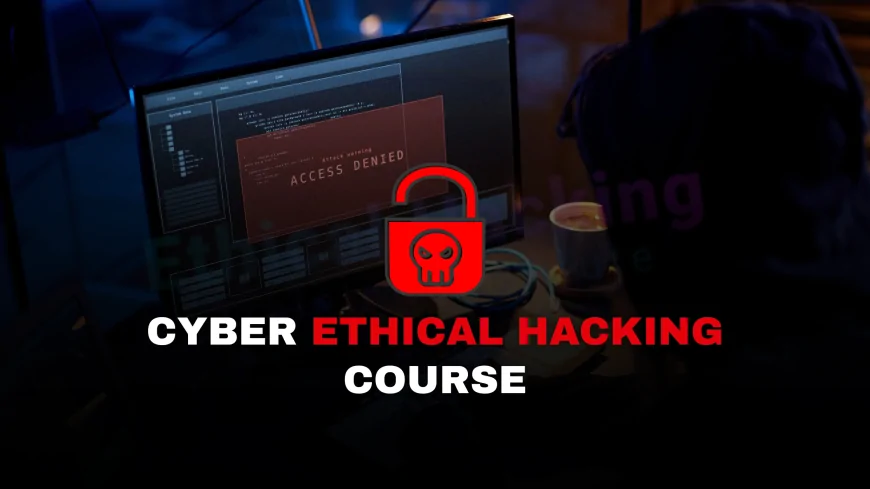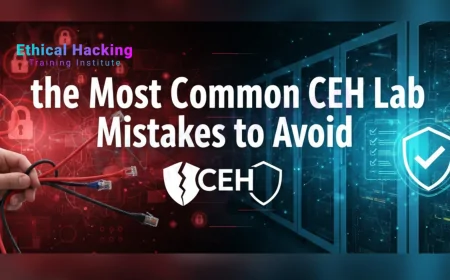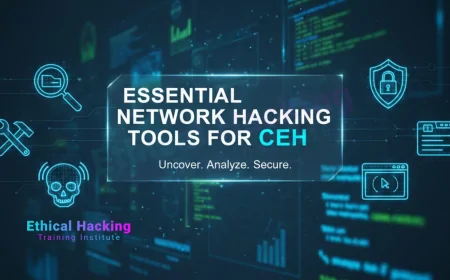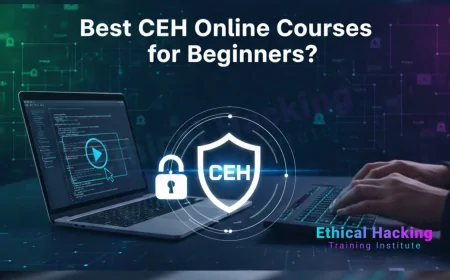Cyber Ethical Hacking Course: Learn How to Protect Systems and Networks | Learn Cyber Ethical Hacking: Protect Systems from Real-World Threats
Enroll in a cyber ethical hacking course to master system and network protection. Learn tools, labs, certifications, and career paths in cybersecurity.

Table of Contents
- Introduction
- Why Ethical Hacking Matters
- Course Structure & Core Modules
- Tools & Learning Platforms
- Hands‑On Labs & Practice Environments
- Certifications & Exams
- Advanced Ethical Hacking Techniques
- Career Paths & Industry Roles
- Ethical Guidelines & Best Practices
- FAQs
- Conclusion
Introduction
The field of cyber ethical hacking focuses on proactively identifying and fixing security vulnerabilities in systems and networks before malicious actors can exploit them. This course outlines a structured learning path—from foundational principles to advanced pentesting techniques—all designed to help you become a cybersecurity expert.
Why Ethical Hacking Matters
Cyber threats are growing in complexity. Organizations use ethical hacking to stay a step ahead of attackers through:
- Identifying vulnerabilities before they’re exploited.
- Preventing costly data breaches and complying with industry regulations
- Building stakeholder trust by demonstrating strong security posture
Course Structure & Core Modules
A thorough ethical hacking course typically includes:
- Introduction to Ethical Hacking: definitions, ethics, and legal scope
- Footprinting & Reconnaissance: OSINT, WHOIS, and passive vs active techniques.
- Network Scanning & Enumeration:Network reconnaissance begins with scanning and enumeration using popular tools like Nmap and service identification methods like banner grabbing.
- System Hacking: exploiting Windows/Linux systems, privilege escalation
- Malware Analysis: static and dynamic analysis of threats.
- Web App Security: OWASP Top 10, SQLi, XSS
- Wireless & IoT Security: WEP/WPA, Bluetooth, embedded devices
- Cloud & Virtualization Security: AWS, Azure, Docker
- Reporting & Remediation: documentation, vulnerability management
Tools & Learning Platforms
You’ll use:
To master ethical hacking, learners must become proficient in using industry-standard tools and platforms that simulate real-world cyber threats. These tools not only support offensive security testing but also help understand how attackers operate—giving ethical hackers an edge in protecting digital systems.
Top Ethical Hacking Tools You Should Know
- Kali Linux: A Debian-based penetration testing OS preloaded with hundreds of security tools like Nmap, Burp Suite, and Wireshark.
- Metasploit Framework: A powerful open-source tool used to develop, test, and execute exploits on vulnerable targets.
- Wireshark: A packet analyzer that allows you to capture and inspect network traffic in real time, essential for reconnaissance and traffic analysis.
- Burp Suite: A web vulnerability scanner that helps detect flaws like XSS, CSRF, and SQL injection in web applications.
- John the Ripper: A password cracking tool that supports brute-force and dictionary attacks for password testing.
- Aircrack-ng: Specializes in cracking WEP and WPA-PSK keys used in wireless networks.
- Nmap: A network mapper that scans for open ports, services, and hosts on a network—essential for enumeration and reconnaissance.
Online Platforms to Practice Ethical Hacking
- TryHackMe: Offers hands-on labs, guided pathways, and beginner-to-advanced cybersecurity exercises in a gamified format.
- Hack The Box: A professional penetration testing platform with real-world challenges and certification paths.
- EC-Council iLabs: The official lab environment for CEH aspirants, providing access to real-world hacking scenarios.
- OverTheWire: Ideal for learning Linux commands, exploit development, and binary-level challenges.
- Cyber Range by Webasha (if applicable): Offers guided lab exercises for students in India and CEH candidates seeking hands-on experience.
Why Tools & Platforms Matter
Mastering these tools and platforms equips learners with the tactical knowledge needed to detect and neutralize threats before they become breaches. They also simulate environments used by real attackers, making your training experience more practical and job-ready.
Hands‑On Labs & Practice Environments
Practical experience is critical. Labs simulate real-world conditions:
- Network setups for scanning, enumeration, and attack hypotheses
- Vulnerable web apps for SQLi, XSS, CSRF testing
- Capture-the-Flag (CTF) challenges to build problem-solving skills.
Certifications & Exams
- Certified Ethical Hacker (CEH): ANSI accredited multiple-choice + labs.
- OSCP: intensive, real‑world penetration testing certification.
- Other options: eJPT, PenTest+, CompTIA Security+
Advanced Ethical Hacking Techniques
- Buffer overflow and exploit development
- Fileless malware and memory-based attacks
- Fuzzing for unknown vulnerabilities
- Advanced web API and serverless exploits
- OT/ICS hacking, SCADA systems security
Career Paths & Industry Roles
Completing this course opens doors to:
- Penetration Tester, Red Team Specialist
- Security Analyst, SOC Engineer
- Security Consultant, Vulnerability Researcher
Job growth in information security is projected at 32% through 2032. Entry-level salaries range between $70K–$120K+ depending on region and certification.
Ethical Guidelines & Best Practices
- Always operate under scope agreements and legal boundaries
- Document methodology, tools, and results thoroughly
- Report findings professionally with remediation guidelines
- Engage in responsible disclosure with vendors and clients
FAQs -
1. What is ethical hacking?
Legitimate simulation of cyberattacks to find and fix security gaps.
2. Do I need to code?
Basic scripting skills in Python/Bash are highly beneficial.
3. How long is this course?
Typically 3–6 months part-time, depending on pace and modules covered.
4. Which OS should I use?
Kali Linux or Parrot OS are standard for ethical hacking labs.
5. Is legality covered?
Yes—ethical scope, authorization, and legal compliance are foundational topics.
6. Can I practice at home?
Yes—through virtual labs and platforms like TryHackMe.
7. What certifications are included?
CEH, OSCP, PenTest+, and others are recommended.
8. Are there hands-on components?
Yes—all modules include practical labs and scenarios.
9. What career can I get?
Penetration Tester, Security Analyst, Red Team specialist, etc.
10. Is ethical hacking in demand?
Yes—global cybersecurity roles are growing rapidly.
11. Do I need experience?
Beginner-friendly paths exist; practical certifications like OSCP require basic knowledge.
12. How is CEH exam structured?
125 MCQs over 4 hours plus an optional practical lab for CEH Master :contentReference[oaicite:11]{index=11}.
13. Is OSCP harder than CEH?
Yes—OSCP demands more hands-on exploit development skills.
14. What salary can I expect?
$70K–$120K+ mid-level; senior roles surpass that.
15. How to start economically?
Use free trials, open-source tools, and community CTFs.
16. Can I work remotely?
Yes—many cybersecurity roles support remote operations.
17. Is this ethical hacking course ANSI-accredited?
CEH is ANSI/ISO‑17024 accredited; OSCP holds industry respect.
18. How often should I update skills?
Continuously—threats evolve, so stay current via CPEs and labs.
19. Are CTF challenges useful?
Yes—they build real skills and test your knowledge under pressure :contentReference[oaicite:12]{index=12}.
20. Is ethical hacking a good career?
Absolutely—it combines technical challenge, high demand, and impactful work.
Conclusion
This comprehensive cyber ethical hacking course equips you with theoretical knowledge, hands-on experience, and recognized certifications. You’ll learn to think like attackers, secure critical systems, and build a rewarding career in cybersecurity. With practice, discipline, and official credentials, you can stand out in the growing field of ethical hacking.
What's Your Reaction?
 Like
0
Like
0
 Dislike
0
Dislike
0
 Love
0
Love
0
 Funny
0
Funny
0
 Angry
0
Angry
0
 Sad
0
Sad
0
 Wow
0
Wow
0


















